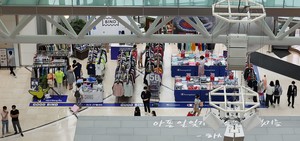![During the week when the '2.5 Steps', a reinforced social distancing, was implemented, the distribution prices were mixed. / A large shopping mall in downtown Seoul is showing a busy appearance.[사진=연합뉴스] Ⓜ](https://i0.wp.com/cdn.mirae-biz.com/news/photo/202101/66634_58928_573.jpg?w=560&ssl=1)
[미래경제 김대희 기자] A survey found that more than half of the Korean people believe that the political sector’s movement to strengthen regulations in the offline distribution industry should ease.
The people thought that the regulation on mandatory closure of hypermarkets should be abolished or relaxed, and there were more opposition to the introduction of the complex shopping mall and online shopping regulation.
On the 24th, the Federation of Korean Businesswomen commissioned Mono Research, a specialized market research organization, to announce the results of the’Distribution Regulation-related Consumer Perception Survey’ conducted through an automated telephone answering system (ARS) for 1036 men and women aged 18 or older.
58.3% of respondents said that regulations such as the abolition of the mandatory holiday system of hypermarkets or the implementation of mandatory holidays on weekdays should be relaxed.
Only 11.6% of respondents said that regulations should be strengthened, such as expanding the number of mandatory holidays.
The mandatory closure system for hypermarkets was created to protect alleys, but only 8.3% of respondents said they visited the traditional market because hypermarkets were not open on public holidays.
In addition, 59.5% of respondents found that when visiting a large-scale mart and shopping complex, they visited stores and nearby shopping centers at the same time.
The FKI explained, “The effect of protecting traditional markets due to the mandatory closure of large marts is not great.” “The business regulation on large marts and complex shopping malls can damage small business owners and nearby shopping malls.”
Also, the opposition (49.3%) against the establishment of a new business regulation that obliges the complex shopping mall to close on public holidays, more than the favor (40.5%).
In particular, when the analysis targets the respondents (519 people) in the metropolitan area, where a large number of complex shopping malls have entered, the opposition ratio rose to 53.6%.
The most common reason for opposing the complex shopping mall’s business regulation was’consumer benefit protection’ at 44.8%. This was followed by’guarantee of cultural and leisure activities’ (29.9%),’not helping to protect local commercial areas’ (16.8%), and’protection of small business owners and suppliers’ (8.5%).
Respondents saying that business regulations should be implemented are’balanced development of the distribution industry’ (31.0%),’protection of alleys’ (25.1%),’protection of traditional markets’ (22.7%), and’activation of local economy’ (21.2%). I picked the reason.
55.1% of respondents said they hope not to introduce sales regulations for online shopping platforms. The percentage of respondents who wanted to introduce business regulations was 34.0%.
The most common reason for opposing online shopping platform business regulations was 70.6%, citing’consumer convenience protection’. The answer was’advancing the distribution industry’ (15.1%).
Respondents who said they should implement business regulations, 41.2% of the respondents chose it as’protecting local stores and online shopping services’.
The FKI expressed concern about discussions on ways to strengthen distribution regulations, such as business regulations for complex shopping malls, without verifying the effect of existing distribution policies.
Send SNS article
View other articles by reporter Kim Dae-hee
